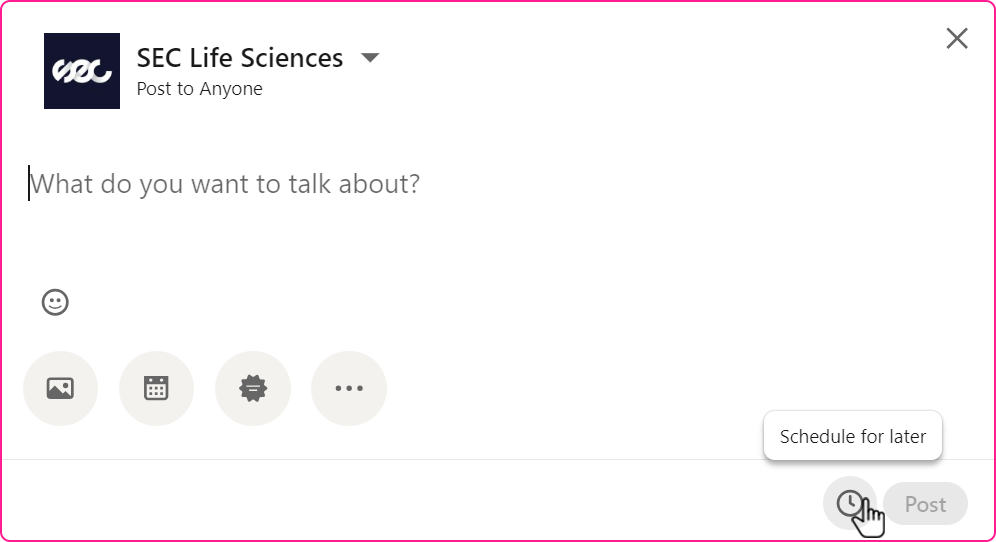Latest News
The case for building your personal brand as a business leader in life sciences
03 Apr, 202411 MinutesWhen we talk about personal branding we’re talking about the process of creating, dev...

When we talk about personal branding we’re talking about the process of creating, developing, and promoting an image or reputation that is associated with you as an individual. In today’s market it is an extremely effective way of communicating to others who you are, what you stand for, and what you can offer.
Personal branding goes beyond just creating a professional image. It is about creating a unique and authentic identity that differentiates you from others.
And it’s not just for individuals looking to advance their careers – it’s also important for business leaders who want to be seen as thought leaders in their industry, gain credibility, and gain a competitive edge.
The importance of personal branding for business leaders
Business leaders who have a strong personal brand are far better equipped to communicate their vision, inspire others, get a target audience onside, and even lead their teams to success.
A strong personal brand can help you gain visibility, credibility and influence, and open up new opportunities for growth; whether that be for your own status in the industry or for the growth of your firm.
In today's digital age, where people have easy access to information and can make their own judgments on a person, if you have a strong personal brand you’re more likely to be perceived as trustworthy and will be more likely to attract customers, investors, partners and potential hires.
But it’s not a one-time task, it's an ongoing effort that requires commitment, dedication, and consistency. It’s something that becomes more natural with time, and eventually helps you align your actions, words and goals, and gives yourself and others a better understanding of what you stand for.
What are you set to gain from a strong personal brand?
Heightened visibility
A strong personal brand enables you to stand out in your industry and increase your visibility among potential customers, clients, potential new hires, and other industry leaders. A personal brand that is well-known and respected can open doors to new opportunities and help you expand your reach.
Credibility
A well-established brand conveys credibility and trustworthiness – and this is truer for individuals than it is corporate entities. This can help you gain the trust of your clients, customers, and partners, which can lead to better and stronger relationships. A personal brand that is seen as trustworthy can also make it easier for you to negotiate deals, form partnerships, secure funding, and grow your team.
Influence
With a strong personal brand you’ll be seen as an expert in your field, and your opinions and advice seen as valuable. You may also be seen as a thought leaders, inspiring others to think differently and move in new directions. This can help you influence the direction of your company and even industry, and to shape the thinking of others. This kind of influence is particularly effective in the digital world.
The ability to impact hiring
A strong personal brand can also make it easier for you to attract and retain top talent. Candidates will be eager to work with a leader who is known for their expertise and influence in the industry, and current employees will be more motivated to stay with a leader who is well-respected and seen as a role model.
A competitive advantage
A personal brand can be used as a competitive advantage to differentiate yourself and the company you work for from others in the same field. It can help build a loyal audience and influence your company’s bottom line or business goals.
Career advancement
Aside from impact on your own team and wider company, a strong personal brand is also going to help you advance your own career. A well-established personal brand opens doors to new opportunities and helps you get noticed by other leading figures and decision-makers in your industry.
Understanding your brand
Ask yourself - what do you stand for?
Your values and mission are the foundation of your personal brand. They are the principles that guide your actions and decisions, and they shape how others are going to perceive you. You should begin by identifying your core values, and ensuring that they are reflected in your personal brand as you conduct messaging.
In terms of a mission, you ought to have one that relates to you as an individual, and that is aligned with the mission of your business. It's important to have a personal brand mission statement that you can use as a guide when making decisions, networking, or communicating.
Another thing to consider is your messaging style - the way you communicate your personal brand to the world. It's what you say, how you say it, and where you say it. A consistent and compelling message and messaging style is paramount when building a personal brand. Think about what you want to communicate and then develop messaging that is consistent across all communication platforms you’re choosing to focus on. Write in the same way you'd speak over the phone or in person; avoid robotic or academic language if it's not how you'd communicate one-on-one.
It's important to note that these three elements are not separate, but are all interconnected. Values inform your mission, which informs your messaging and together, they should create a consistent narrative, identity and strategy for you to communicate your personal brand.
Discovering and defining your personal brand
One of the key steps in this process is to conduct a personal brand audit. This involves evaluating your current personal brand and identifying areas for improvement. You might want to consider the following questions:
- How are you currently perceived by your colleagues, peers, and industry experts?
- What are your unique strengths and areas of expertise?
- What are your values and what drives you in your personal and professional life?
- How do you want to be perceived by others?
Another step you could take is to conduct some light research on your industry, competitors, and target audience. This will help you to identify gaps in the market and to understand the needs and values of the people you’re hoping to resonate with. You can use this information to create a messaging that engages your target audience and sets you apart from your competitors.
Finally, it’s time to put together an action plan on how to communicate and implement your personal brand on various platforms and mediums, in order to make sure that it’s consistent and that it reaches your target audience. It’s important to align this with the values, mission and messaging that you’ve already identified.
Communicating your personal brand
Consider your messaging frequency
Most of us will be using LinkedIn as our primary communication channel when we start out in building our personal brand, but you may want to extend to email newsletters, or even going offline at in-person events. For LinkedIn, 3 posts per week is a good starting block to commit to when aiming to establish your personal brand. This may sound like a lot, but can be made up of re-shares with insight or topical commentary, as well as your original ideas.
Tools like HootSuite, SproutSocial and Buffer, as well as LinkedIn's new native scheduler, can help ensure you can plan ahead and publish your ideas in advance rather than worrying about ad-hoc publishing as-and-when an idea arises.

LinkedIn's new 'Schedule for later' function can help you schedule your weekly or monthly content in one go.
Go where your audience is
Not all social media platforms are equally effective for personal branding. Evaluate which platforms your target audience is most active on and focus on building a strong presence on those platforms. For example, if your target audience is primarily professionals in your industry, then LinkedIn may be a more effective platform than Instagram.
Once you're aware of where your target audience are likely to be, develop a communication plan and stick to it. Consistency is key to building a strong personal brand on social media. Establish a consistent visual aesthetic, messaging structure, and tone of voice to make it easy for people to identify and remember you.
Consider what you want to be known for in that communication plan. Share content that is relevant, informative, and valuable to your target audience, which could include information about your industry, thought leadership pieces and insights.
It's important to remember it's not always about work - showcase your personality too. Sharing personal stories, pictures, and insights gives people a sense of who you are as a person and what you stand for outside of the office.
Once you've established and are delivering to your communication plan, you can begin networking and engaging with other professionals in your industry. Remember that social media is a two-way street - follow other thought leaders and influencers in your field, and actively participate in conversations and discussions. It'll help to increase your visibility and establish you as a respected member of your community.
Take things offline
Aside from what you're able to achieve on platforms like LinkedIn, public speaking can be a powerful tool for business leaders to communicate their personal brand. It allows you to share your expertise, connect with others, and build your reputation.
One effective strategy for increasing your profile is to choose speaking opportunities that align with your personal brand and target audience. If your personal brand focuses on life science tech and innovation, you might want to look to speak at technology conferences or events, or host roundtables within your own company and communicate the outcomes externally.
When preparing for a speaking engagement, it's important to develop a clear and compelling message that aligns with your personal brand. This will help you stand out from other speakers and make a lasting impression on your audience.
Speaking engagements often include a Q&A session, which offers a good opportunity for engagement with your target audience and gather support for your personal brand.
It's also worth mentioning that public speaking is not only limited to big events, but also includes meetings, presentations, webinars or podcasts. These can be a great way to increase your visibility and reputation within your firm or the wider life sciences industry.
Ongoing management of your personal brand
The role of reputation management
It’s important to stay on top of the overall perception of your personal brand. Your reputation can be managed effectively by monitoring your online presence, taking advice from stakeholders around you, and responding to any feedback or criticism. This will enable you to proactively build and maintain a positive reputation.
Be aware of your digital footprint and the paper trail all online activity leaves, and if criticism arises, have a plan in place for dealing with it to mitigate any long-term negative impact on your brand.
Overcoming negative perceptions
You aren’t going to please everyone with your thoughts. The best case scenario with personal branding activity is that you’re displaying thought leadership, but that can sometimes come with some negativity.
Negative perceptions of your personal brand can be damaging to your career and your company, so it's important to be proactive in identifying and addressing any potential negative perceptions.
One way is to monitor online mentions of your name or company. You can use tools such as Google Alerts or Mention to do this. Additionally, it's important to be aware of any rumours or negative comments that may be circulating within your industry, such as unsavoury comments by disgruntled former employees or colleagues—these may actually provide a good opportunity to publically dispel negativity in your content.
Another way to identify negative perceptions of your brand is to conduct a personal branding audit. This can include interviewing colleagues, friends, and industry peers to gather feedback on your personal brand and identify any areas for improvement.
Once you have identified any negative perceptions of your personal brand, it's important to take action to address them. Address any issues directly and transparently, whether that is through a public statement or a private conversation. Additionally, you may want to take steps to change the behaviour or communication that led to the negative perception, and focus on on actions that show positive changes.
Updating and maintaining your personal brand
Personal branding is not a one-time effort, it's an ongoing process that requires constant attention and adaptation. Keeping your personal brand relevant and fresh is important in order to stay top-of-mind and continue to be seen as an authority in a changing field.
Stay informed and educated in your industry - continuously learning and staying up-to-date on the latest trends and developments in your field will help you stay relevant and add value to your personal brand.
Being open to feedback is also important. Seek feedback from others, both positive and constructive, to gain insight into how others perceive your brand and make adjustments as needed.
Maintaining your personal brand is an ongoing process that requires effort and dedication, but regularly reviewing and updating your online presence is something that’ll come naturally with time.



